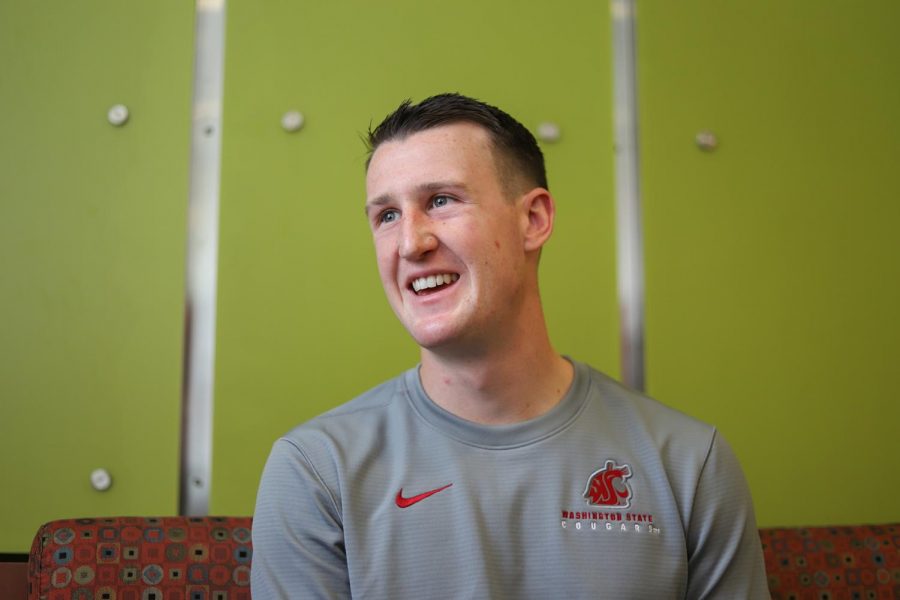Club helps prepare students for life after college
WSU Cougar Battalion brings opportunity for diversity
Troy Gingerich, WSU Army ROTC Cougar Battalion Associated Body of Cadets president, talks about his involvement in ROTC and Cougar Battalion Wednesday morning in the CUB.
October 21, 2019
The Cougar Battalion, a Registered Student Organization, gives its members the opportunity to experience what the Army can offer them while learning leadership and survival skills.
The Army ROTC program is a four-year pre-professional internship to gain a commission as a 2nd Lt. in the United States Army, Cougar Battalion adviser Brendan Hobbs said.
The Cougar Battalion is a club associated with ROTC and helps the organization fundraise and host certain events, such as a winter formal, said Troy Gingerich, senior history major and Cougar Battalion president.
The program came into existence over 100 years ago. There used to be a military campus and ROTC cadet detachment in Pullman, Hobbs said.
The Army ROTC has about 118 cadets this year, and about 80 of them are on scholarship or contracted to become officers, he said.
Gingerich joined the program his freshman year at WSU after receiving a three-year scholarship from ROTC at the national level.
The WSU track & field team also recruited Gingerich to pole vault, which is his fourth year competing.
Gingerich is not the only family member to serve in the military. His brother served in the Marine Corps for four years, he said.
Gingerich hopes to serve in the Army infantry, a competitive part of the Army, after he graduates in the spring, he said.
“You’re like the tip of the spear when it comes to fighting our wars [as someone in the Army infantry],” Gingerich said.
Gingerich oversees fundraising for the Cougar Battalion, which helps provide clothing for cadets.
The group provides security at home football games as its main way of fundraising, he said.
“It gives us some money to work with,” Gingerich said, “so our cadets don’t have to pay for things.”
Cadet’s involvement in the ROTC and the Cougar Battalion varies based on year in school.
Freshmen, or a student’s first year in the program, is an introduction to physical training and leadership labs. Students can compete for a contract or a scholarship, Hobbs said.
Cadets have physical training on Monday, Wednesday and Friday mornings. They can also go out in the woods to work on marksmanship using Army weapons, he said.
“All of them at some point during their freshman or sophomore year have committed to be servant leaders for their nation,” Hobbs said.
When a cadet becomes a junior, the main focus for the program is on a camp during the summer for about 37 days, he said.
“It’s basically a monthlong test of everything we teach in the program,” Hobbs said.
The camp helps determine where cadets will be placed after they graduate.
Junior and senior cadets also travel to Camp Seven Mile in Spokane County for a two-day trip in the spring. They are tested on tactical skills and evaluated on if they can manage themselves and peers in a physically and mentally taxing environment, Hobbs said.
“It’s always cold and wet,” he said. “They’re out all night, they’re carrying all their gear and they’re using live weapons to engage an enemy.”
Camp Seven Mile is meant to test what members have learned, such as how to use a map and compass, like a capstone course, Hobbs said.
Students graduating from the Army ROTC go into a variety of careers, he said.
One student graduated from the Honors College with a degree in biology. She was the 31st female to graduate from the United States Army Ranger School. Now, she is an armor officer at Fort Drum, New York, which opened to females in 2017, Hobbs said.
Another student just graduated from flight school and now is an attack helicopter pilot, he said.
ROTC does not only produce Army officers. There is an ROTC graduate who is in seminary right now studying to become a minister as an Army chaplain, Hobbs said.
Gingerich said once he graduates, he will take with him the lessons he learned being in ROTC, including being a good leader and working with different kinds of personalities. He would not have learned these skills without ROTC, he said.
“Sometimes it’s a challenge because your personality might not fit with someone else’s,” Gingerich said.











